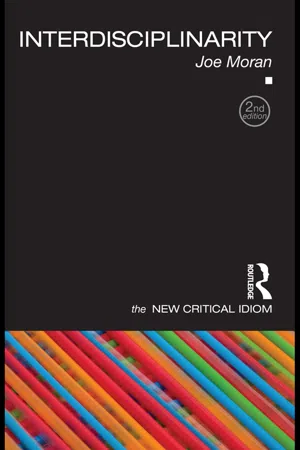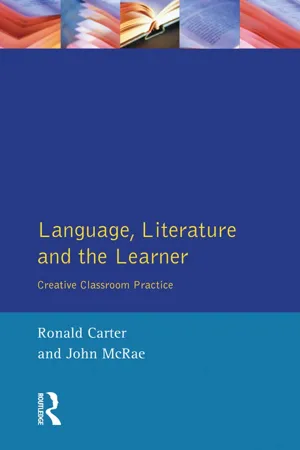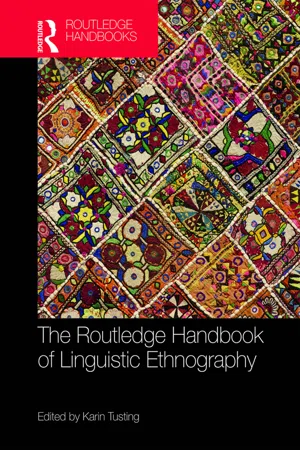Cultural Studies
Cultural Studies examines the ways in which culture, including literature, shapes and reflects society. It explores how power dynamics, identity, and social structures are represented and contested in cultural texts. By analyzing the production, consumption, and reception of cultural artifacts, Cultural Studies seeks to understand the complexities of human experience and the role of culture in shaping our worldviews.
7 Key excerpts on "Cultural Studies"
- eBook - ePub
- Sara Upstone(Author)
- 2017(Publication Date)
- Teach Yourself(Publisher)
...14 Cultural Studies Whether they are biological organisms, communities or nations, cultures are what grow. In these terms, we can think about Cultural Studies as focused on the growth of particular identities, concerned for the ways in which we shape our understanding of the world around us in our everyday lives. How, then, is this important for literary studies? From a Cultural Studies perspective, texts are one aspect of a complex set of cultural influences also including film, visual art, performance, mass media, advertising, the Internet and music, which individuals and groups interact with in order to form cultural identities. Literature in this respect is an important contributor to the meanings we make in everyday life. In keeping with the ideas of reader response theory, the text exists not as a stable unit of meaning but, rather, as something shaped by the specifics of when and how it is encountered. At the same time, it can serve as evidence for a particular cultural presence. Literature is a dynamic force that is simultaneously shaping and being shaped by the culture in which it is consumed. What is culture? Concern about questions of culture began in the nineteenth century – with Matthew Arnold’s Culture and Anarchy (1869) – and stretched through to F. R. Leavis’s formalism in the early to mid-twentieth century. What we call Cultural Studies, however, began in earnest in Britain in the 1950s, with the work of two British academics associated with the cultural materialism movement (see Chapter 15): Raymond Williams (1921–88) and Richard Hoggart (1918–2014). The early work by these critics – Williams’s Culture and Society (1958) and Hoggart’s The Uses of Literacy (1957) – question some of the assumptions of Arnold and Leavis regarding the role of culture...
- eBook - ePub
- Joe Moran(Author)
- 2010(Publication Date)
- Routledge(Publisher)
...2 LITERATURE INTO CULTURE There is a sense in which the contemporary field of ‘Cultural Studies’ could be said to be synonymous with interdisciplinarity itself, given that it draws variously on sociology, anthropology, history, linguistics, philosophy, textual criticism, visual culture, the philosophy of science, geography, politics, economics and psychology, among other areas. In this chapter, though, I am going to be more specifically concerned with the positioning of Cultural Studies at the intersection between the social sciences, particularly sociology and anthropology, and the humanities. One of the effects of this has been to challenge the disciplinary identity of literary studies by dissolving the category of ‘literature’ into the more inclusive notion of ‘culture’. More broadly, it has meant that Cultural Studies has been characterized by its critical reflection on the confining nature of disciplines and the possibilities for interdisciplinary knowledge. It is worth pointing out, first of all, that Cultural Studies is about far more than challenging the divisions between individual disciplines. Rooted in socialist politics and new social movements such as feminism, anti-racism and gay activism, its commitment to integrative study and to expanding the definition of ‘culture’ has been linked to questions about the cultural construction of identity and meaning, particularly in relation to the broader operations of power in society. Cultural Studies therefore tends to be suspicious of those interdisciplinary programmes that merely adopt an inclusive approach to the study of culture without engaging with these concerns about the politics of knowledge and representation. In this context, Patrick Brantlinger criticizes American studies, which emerged as an interdisciplinary collaboration between literature and history departments after the Second World War, in reaction to what was perceived as the narrowly textual approach of academic literary criticism...
- eBook - ePub
- Ben Agger(Author)
- 2014(Publication Date)
- Spon Press(Publisher)
...All of this work together suggests that one of the crucial contributions of Cultural Studies lies in its heightening of the literary self-awareness of academics trained for years to view their prose and research writing as hollowly ritualistic. Instead, we learn, academic writing is a peculiar language game (Wittgenstein, 1953) that participates in the transaction of power, notably in the way in which authorial self-consciousness is either repressed or marginalized in science writing. This is only one of the many ways that the sociological, political-economic and deconstructive examination of various cultural rhetorics helps differentiate Cultural Studies from more traditional approaches to the interpretation of culture (e.g., Leavis, the New Criticism; see Eagleton, 1983). It is hopeless to decontextualize cultural expression, especially where the culture industry is big business. Moreover, deconstruction instructs us that language itself is a con-text of sorts, imposing a particularly determinate meaning on those who attempt to ‘use’ language (but who end up being used in turn). Cultural Studies broadens interpretive focus to include extra-textual aspects of a work’s context (or, as I call it throughout this book, con-text). It does so dialectically, eschewing both the objectivism of the New Criticism and other pristine methodologies of close reading, on the one hand, and an economistic reductionism, on the other. In this sense, much of the best work in Cultural Studies is heavily influenced by neo-Marxist and western-Marxist innovations in the traditional Marxist analysis of culture. Gramsci and the Frankfurt critics are examples of this. All of these people believed that culture is so dialectically intertwined with the economic functions of capitalism that the two spheres blur to the point of virtual indistinguishability...
- eBook - ePub
- Tonya Krouse, Tamara F. O'Callaghan(Authors)
- 2020(Publication Date)
- Bloomsbury Academic(Publisher)
...However, arguments are just verbal discourse, not armed combat. Because we conceive of arguments in terms of this metaphor, we perform and describe them as such. However, we must not overgeneralize that meaning from limited linguistic evidence. There remains a need to establish consistent criteria for identifying such metaphors. Even though cognitive approaches to literary studies can help reveal the meaning of a literary text, it is important to note that the methodology of the field is still very much evolving. What Is Literary Studies in the Twenty-First Century? How Does It Connect to English Studies, More Broadly conceived? In the twenty-first century, literary studies is a field of English Studies that is in transition. Whereas throughout much of the twentieth century people viewed literary studies as synonymous with English, the discipline of English has now expanded to place a greater emphasis on writing skills and writing fields, including rhetoric and composition, creative writing, and professional writing and technical communication. Additionally, many scholars and students who might have once chosen to focus their attention on canonical literary texts now find themselves intrigued with the field-shaping possibilities of working on cinema, popular culture, and new media. Where does that leave literary studies? This is the question that many scholars and teachers of Literature are attempting to answer. First, students should remember that there are deep connections between the critical thinking that close reading and interpretive analysis engender and the development of strong writing skills. Through the reading and study of literary texts, individuals strengthen their vocabularies, their fluency in the English language, and their ability not only to communicate their own points of view but also to listen to and understand the points of view of others...
- eBook - ePub
Language, Literature and the Learner
Creative Classroom Practice
- Ronald Carter, John Mcrae(Authors)
- 2014(Publication Date)
- Routledge(Publisher)
...First, we have to deal with our well-grounded anxieties about the present increasingly shrinking status of English Literature in our university curriculum and then explore the possibility of creating a space for negotiation and compromise over redefinitions of literature. Building on the integrated British Studies teaching models proposed by Carlin Dick (1992), I shall, no doubt very summarily, use three texts – John Osborne’s Look Back in Anger, Neil Jordan’s The Crying Game, and Ted Hughes’s poem Hawk Roosting – to show how we can design teaching plans with units on specific topics while adopting a three-level comparative approach to the teaching of British Cultural Studies through literature. While using some of the ideas from discourse analysis (Carter and Simpson 1989) and also suggestions for activities from the brilliant book Literary Studies in Action (Durant and Fabb 1990), the final part of this essay will be devoted to a discussion on how to do things with texts, rather than how to teach texts. The ideology behind this methodology is the belief that the long-standing separation of language teaching and literature teaching, although one could give many good reasons for the separation, has been but one of the mythologies that still haunt the teaching profession and therefore need to be carefully re-thought. Perhaps it is necessary to re-state that language is an inseparable part of a culture. The values, norms and taboos of a society, and the ideas, feelings, and identities (personal, national, political, sexual, or cultural) of a particular group of people are constructed and communicated through the use of language. For a non-native learner, the most exciting and rewarding way of ‘experiencing’ them is through reading, tasting and analysing its literary and cultural products, hence interfacing language and literature in our classroom. In other words, language learning has to be put back into its cultural context...
- eBook - ePub
- Kylie A. Peppler(Author)
- 2017(Publication Date)
- SAGE Publications, Inc(Publisher)
...Julian Sefton-Green Julian Sefton-Green Sefton-Green, Cultural Studies Cultural Studies 181 184 Cultural Studies Cultural Studies as an academic discipline is interested in how the practices, behavior, social interaction, and structures of communication provide insight into how power operates, how people become who they are, how resistance is organized, and how society changes. The discipline draws on sociology, politics, social psychology, social anthropology, and communication and literary studies to not only depict just outward forms of expression but also analyze the values and ideologies of interrelated social worlds. The field of out-of-school learning sits at an intersection between child- and youth-centered interests, the structures society provides to educate and to ensure equality of opportunity, and the interests and concerns of families. It takes place in specific contexts, to which some young people have better access than others, and validates and supports kinds of engagement and motivation, which both can and cannot be found in schools and in families. The discipline of Cultural Studies thus makes three distinct contributions to the field of out-of-school learning. First, Cultural Studies pays attention to the ways in which school, as an institution, plays a key part in the maintenance of traditional power relations in society and, in particular, reproduces class-based, gendered, and racialized youth. The institutions and practices of out-of-school learning offer scope for extending this analysis as the learning that takes place out of school is sometimes in dialogue with formal education...
- eBook - ePub
- Karin Tusting, Karin Tusting(Authors)
- 2019(Publication Date)
- Routledge(Publisher)
...This demonstrates key current concerns in literacy studies over developing theoretical underpinnings from more traditional sociocultural theories into multimodality and new ways of approaching considerations of time and space, drawing on contemporary philosophers of materiality (Deleuze & Guattari, 1987; Barad, 2007; Bennett, 2009). The final two section titles demonstrate the persistence in literacy studies of attention to vernacular literacies and the importance of finding out about people’s authentic social and cultural connections, rather than resting on assumptions made, very often, from “above” (Barton & Hamilton, 1998). As digital technologies and especially the internet became more pervasive in many societies, literacy studies researchers have also demonstrated the value of studying people’s practices across digital and physical domains, and complexifying issues of “access”. In a powerful polemic Gee (2003) argued that video games embodied better design principles for learning than formal education. Main research methods including approaches to analysis This section will elucidate the main research methods of literacy studies, which can inspire linguistic ethnographers. Readers of this handbook will notice an essential overlap in methodologies with much other research in this area, as so much literacy studies work has adopted “the conjuncture of ethnography and linguistics” that Rampton et al. (2004, p. 2) described in their UK Linguistic Ethnography Forum position paper. They argued that “language and the social world are mutually shaping, and [that] close analysis of situated language use can provide both fundamental and distinctive insights into the mechanisms and dynamics of social and cultural production in everyday activity”. Both the study of talk and the study of context are combined in fieldwork. It is beyond the scope of this section to illustrate all the possible methodological approaches of literacy studies to linguistic ethnographers...






